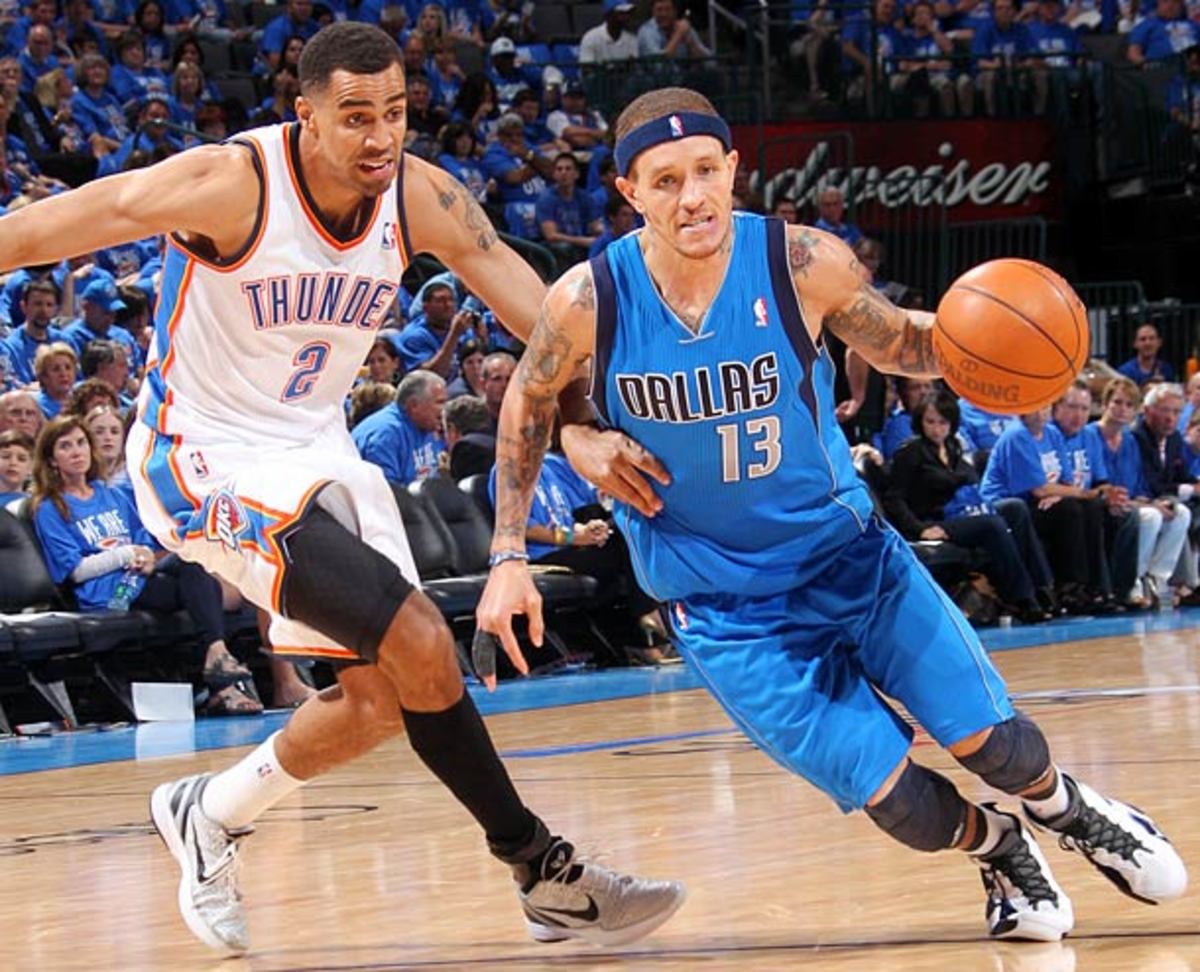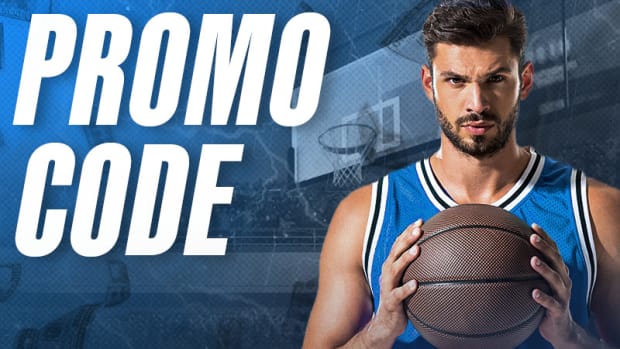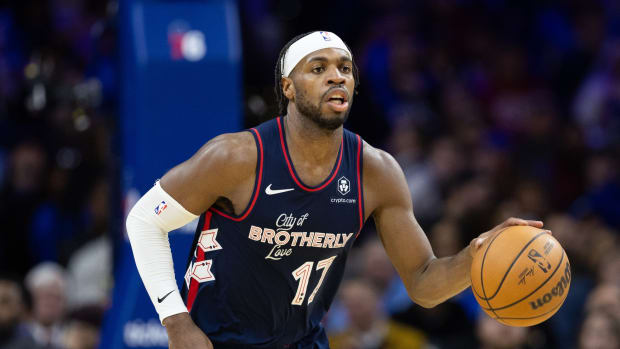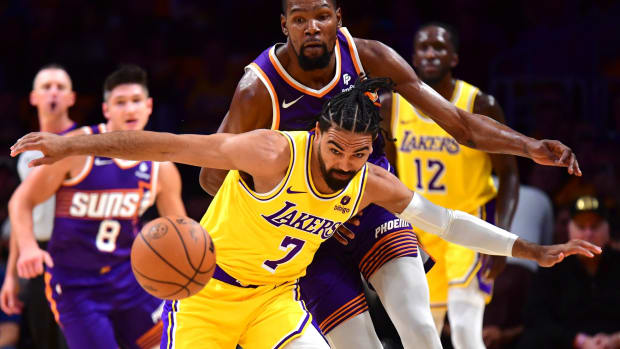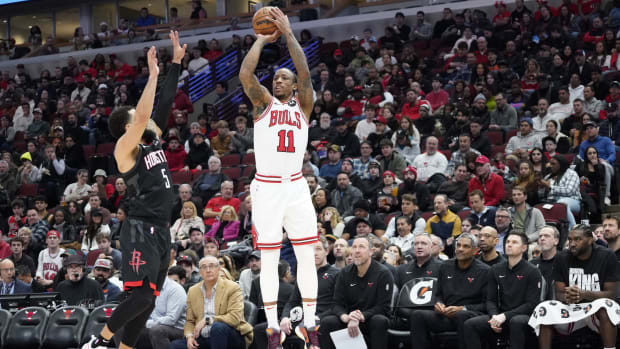NBA's finest minimum-salary players
Delonte West (right) holds his own at both ends of the court for Dallas. (Layne Murdoch/NBAE via Getty Images)
By Rob Mahoney
With teams looking to stockpile elite talent, the rotational value of quality, low-cost role players has unexpectedly skyrocketed. The luxury-tax implications involved in piling up massive contracts demands a complement at the other end of the financial spectrum, and thus the league’s best teams aren’t those able to rack up the most star power, but those able to build around those stars without bumping up against the limitations of the cap and tax.
Salary-cap exceptions are, now more than ever, a tremendous resource, which is why today we turn our attention to the slimmest exception pay scale of all: the league minimum. It may not be the preferred payout level for veterans in search of job security, but it’s proved to be valuable rotation mortar for big-spending contenders and cost-conscious playoff clubs alike. With that in mind, here are some of the best players on a league-minimum salary:
Flaws and All
Delonte West, Dallas Mavericks
2012-2013 Salary: $1.2 million ($854,389 by the Mavs, the rest by the NBA)
Some see West for his bipolar disorder or his rap sheet, but neither should overshadow his tremendous value as a role player. Behind that colorful reputation is a perfect complementary type, capable of filling out a backcourt at either position without compromise. Whether with the ball or without, defending the ball or chasing cutters off of it, West gets the job done. He works hard and produces, and is well worth the extra consideration and care (last week the Mavericks deftly handled West's suspension and quick reinstatement) given how friendly his deal is on the cap sheet.
Antawn Jamison, Los Angeles Lakers
2012-2013 Salary: $1.35 million ($854,389 by the Lakers, rest by the NBA)
Any discussion of what kind of player Jamison is naturally drifts into a conversation of what he isn’t. Fourteen years in the NBA have turned a questionable defender into a poor one. Solid rebounding from the wing has faded into meager returns from the power forward position. Reasonable shooting percentages have slipped downward, and a high-volume shooter no longer warrants such a considerable slice of his team’s attempts.
Yet even after all of that regression, Jamison is still a useful reserve scorer to have around at a bargain-bin price. Average perimeter shooting and Jamison’s knack for coming up with buckets out of broken plays are worth that minimum salary alone, which is to say nothing of the nights when the 36-year-old has a throwback scoring performance. He’s an obviously incomplete player, but a nice asset in filling a roster on a budget.
C.J. Watson, Brooklyn Nets
2012-2013 Salary: $992,680
Watson may wind up being remembered for his season-killing errors in the Bulls’ first-round series against the Philadelphia 76ers, but his work for Chicago in the regular season was far more memorable. It was Watson, after all, who somehow kept the Bulls’ offense running at an elite level (fifth in offensive efficiency) with Derrick Rose floating in and out of the lineup, and his work on the other end helped to provide a front for coach Tom Thibodeau’s staunch defensive system. His style is fairly conservative and the results are often unspectacular, but the safety of his game is worth much more than the minimum in the right context.
Ronnie Brewer, New York Knicks
2012-2013 Salary: $1.1 million ($854,389 by the Knicks, the rest by the NBA)
Brewer is one of the top perimeter defenders, and for that reason alone a minimum contract is outstanding value. But the real bonus lies in Brewer’s misunderstood offensive game. What many see as guard with no creative capacity and a shoddy jumper is actually an adept cutter, schooled through years of running the flex offense under Jerry Sloan in Utah.
Brewer does fine work for any team that allows him to move, and has wrongfully been blamed when isolation-heavy offenses park him in the corner. His inability to shoot is only a weakness if his own team makes it one; provided his teammates can space the floor and handle the initiation of the offense, Brewer can be a useful offensive asset in addition to a defensive boon. But all of that proves a bit too conditional for NBA employers, apparently, who allowed the Knicks to make a steal of a signing for the lowest possible amount.
Gary Neal, San Antonio Spurs
2012-2013 Salary: $854,389
The sharpshooter's purpose on the court is simple: cut and curl as necessary, handle the ball in spots and shoot whenever open. The undrafted 28-year-old has converted an impressive 42 percent of his three-point attempts in each of his two seasons, and no matter how San Antonio's offense evolves to suit its versatile personnel, Neal's role will remain completely static.
Dominic McGuire, Toronto Raptors
2012-2013 Salary: $992,680
There’s no way to sugarcoat this one: Dominic McGuire is an absolutely abysmal offensive player who hurts his team’s scoring efforts while on the floor. He makes Jared Jeffries look like a dominant finisher by comparison and has absolutely no range. He works the offensive glass relatively well and does a better job with the ball than you might expect, but his inability to provide any sort of offensive threat makes it remarkably difficult to for coaches to include him in typical lineups.
He’s a role player who can be far more trouble than he’s worth, and yet his defensive versatility is alluring enough to warrant a roster spot and some consideration. He's that capable, if only on one side of the ball. But if players across the league can get by as competent scorers but miserable defenders, why can’t McGuire find his way as an atrocious offensive player with a dynamic defensive game? Players with McGuire’s size (6-foot-9), mobility and instincts are hard to come by, and though the jury’s still out on whether he could take on a bigger role in the right setting, it’d be fascinating to see a curious coach someday give him a try.
The Up-and-Coming
Sacramento's Isaiah Thomas (left) earned a starting job as a rookie last season. (Chris Trotman/Getty Images)
Isaiah Thomas, Sacramento Kings
2012-2013 Salary: $762,195
Rarely do second-round selections find NBA success so quickly, and rarely do players chosen with the 60th and final pick of the draft manage to hang around in the league at all. But the 5-foot-9 Thomas is an exceptional player and a noteworthy talent, even if he’s overdue for a recalibration of public expectation. Coaches, teammates and fans all expect different things from proven rotation players than they do of second-round afterthoughts, and it’s on Thomas to sustain -- and improve on -- his rookie-year play.
The defensive end is as good a place as any to start. Thomas’ size will put him at a considerable disadvantage in almost every game he plays, and he’ll need to adapt his defense accordingly in order to offset the added difficulty of contesting shots. The leaps he’ll need to make won’t be easy, but Thomas’ offensive skills are sturdy enough to buy him plenty of time. At 22, Thomas is already a respectable outside shooter and a credible threat in the pick-and-roll. He isn’t the most prolific playmaker, but Thomas’ scoring instincts aren’t at all intrusive, either. He simply plays a different style from the point guard ideal, albeit one that’s completely agreeable with a larger team concept.
Brandan Wright, Dallas Mavericks
2012-2013 Salary: $992,680
Big men typically come with built-in salary inflation, but Wright -- an explosively athletic 25-year-old -- somehow slipped off the radar after a run of injuries. That turned out to be to the Mavericks’ considerable gain, as Wright’s energetic style last season gave coach Rick Carlisle a valuable change-of-pace option off the bench and a prospect to groom in Dallas’ system.
At this point, Wright’s quickness and jumping ability are likely his best NBA assets, but one shouldn’t shortchange his capability as an in-between scorer. Wright was consistently able to convert half-hooks and short jumpers during his first year in Dallas, despite his lack of technical, back-to-the-basket skill. He’s inescapably raw, but as the Mavs found out last season, the No. 8 pick in the 2007 draft is still quite useful in his current form.
Plus, this gem of Wright inspiring Dirk Nowitzki to go nuts on the Mavs’ local broadcast is well worth the minimum salary on its own:
http://www.youtube.com/watch?v=x6uALYCAaoM&feature=fvwrel
Jon Leuer, Cleveland Cavaliers
2012-2013 Salary: $762,195
Life on the NBA’s fringes can be made considerably easier by having just a single marketable skill. Leuer certainly has that: The 6-foot-10 forward converted shots from most every intermediate zone at a rate well above the league average in his rookie season, and helped his team’s offense significantly in the process. It’s not glamorous work, but Leuer, the 40th pick in the 2011 draft, is incredibly consistent on his mid-range spot-up tries. He did a fantastic job in Milwaukee of making opponents stick with him on the weak side of the floor.
That may seem like a minor element of a five-man offense, but simply by forcing opponents to defend him outside the lane, Leuer opens up chances for dribble penetration and easy baskets. That he needn’t be involved directly in shot creation is a bonus; Leuer isn’t often put in a position where he has to make difficult plays or even make all that many mistakes. He simply takes the shots available to him and passes if they’re no longer there. That brand of low-risk basketball behooves a player with such a focused skill set, and allows teams to draw value from Leuer’s shooting without making issue of his limitations.
Worthy of Note
Andray Blatche, Brooklyn Nets: Could very easily prove to be the best or worst player on this list. A more likely bet: simply the most frustrating.
Chris Wilcox, Boston Celtics: Often seems out of place on a team with such a well-informed defensive concept, but Wilcox does a solid job of keeping defenses honest with his finishing ability.
James Anderson, Atlanta Hawks: We still haven't seen all that much of Anderson in his two NBA seasons after San Antonio made him the 20th pick in the 2010 draft, but his performance to date suggests some interesting scoring potential.
Rashard Lewis, Miami Heat: Lewis hasn’t quite been himself for the last three seasons, but a minor role on the best team in basketball could help him to redefine his game.
Matt Barnes, Los Angeles Clippers: The veteran forward adds to the Clippers' depth with the ability to rebound and make some threes.
All salary information courtesy of the invaluable Sham Sports.






























